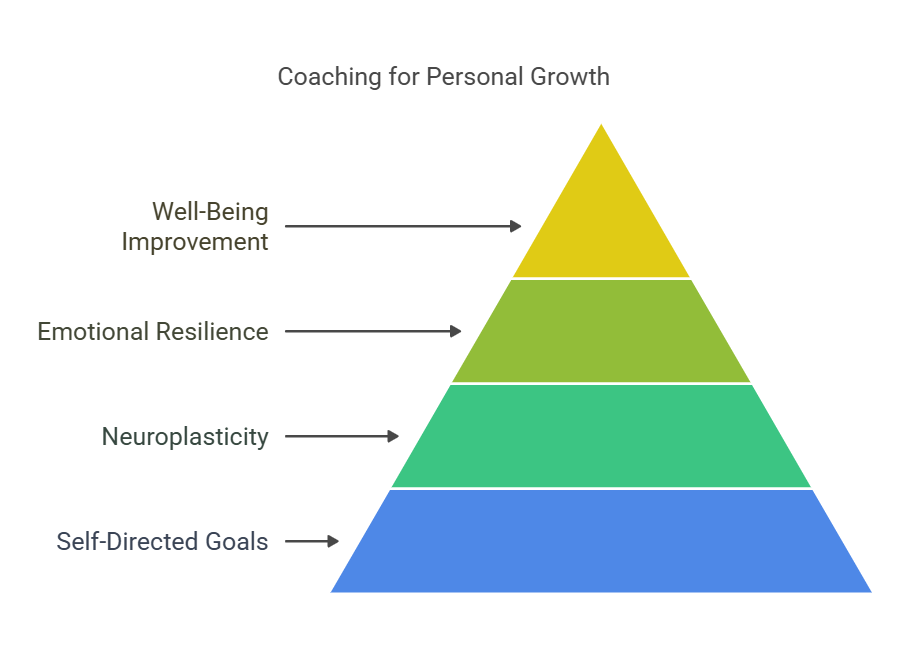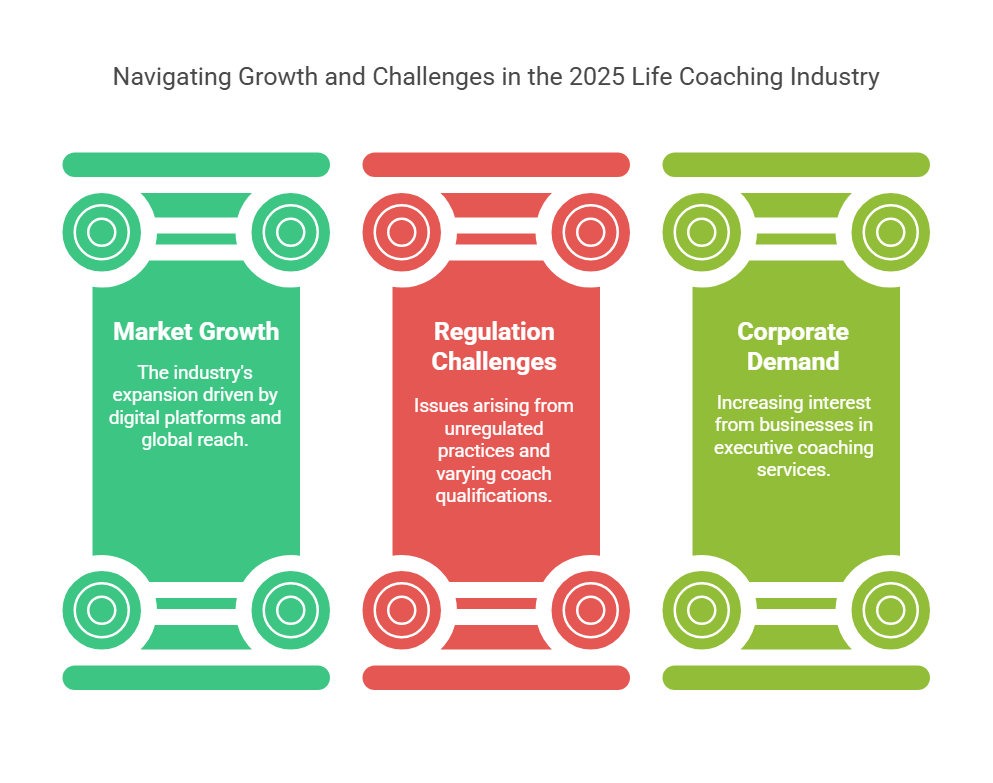The Best Articles on Life Coaching: Insights and Realities to Consider
Life coaching is a process where a trained professional, known as a life coach, helps individuals make positive changes in their personal and professional lives. A life coach serves as a guide, motivator, and accountability partner, assisting clients in discovering their strengths, overcoming obstacles, and achieving fulfillment. The International Coaching Federation (ICF) defines coaching as “partnering with clients in a thought-provoking and creative process that inspires them to maximize their personal and professional potential.”
The field of life coaching has grown significantly, with specialized niches such as career coaching, wellness coaching, and financial coaching. As people increasingly seek guidance in navigating life’s challenges, life coaching has become a valuable resource for personal development and transformation.
The Science Behind Life Coaching
Scientific research supports the effectiveness of life coaching in improving various aspects of well-being. Studies have shown that coaching can enhance self-efficacy, goal attainment, and overall life satisfaction. Coaching interventions have been linked to positive changes in mental health, including reduced stress, increased motivation, and improved emotional resilience.
One key principle of life coaching is that clients identify their most important issues and prioritize their own goals. This self-directed approach increases the likelihood of lasting change. Additionally, coaching fosters neuroplasticity—the brain’s ability to adapt and develop new patterns—leading to improved self-regulation and emotional well-being.
Recent research highlights that virtual coaching is just as effective as in-person coaching, making it more accessible to individuals worldwide. With advancements in technology, AI-assisted coaching tools are also emerging, providing additional support for both coaches and clients.
Benefits of Working with a Life Coach
Working with a life coach can bring significant improvements in self-awareness, decision-making, and goal achievement. Life coaching offers personalized support in various areas, such as career advancement, relationships, health, and personal growth.
One of the key advantages is overcoming self-limiting beliefs and fears that hinder progress. Coaches help clients reframe negative thought patterns and build confidence. Additionally, life coaching has been linked to positive changes in brain function, enhancing cognitive flexibility, problem-solving skills, and emotional intelligence.
Another growing trend in 2025 is the integration of mindfulness and emotional intelligence training into coaching programs. Many coaches now incorporate evidence-based techniques from psychology to maximize client success.
Becoming a Life Coach
To become a life coach, individuals must acquire proper training, develop coaching skills, and continuously enhance their expertise. Enrolling in a reputable training program that covers coaching methodologies, ethics, and business strategies is essential. Gaining hands-on experience through mentorship, supervised sessions, or practice coaching helps build confidence.
Certification through organizations such as the ICF is highly recommended to establish credibility. While life coaching remains an unregulated industry, having professional credentials can distinguish qualified coaches from untrained practitioners.
New trends in the industry include AI-assisted coaching platforms, specialized coaching for neurodivergent individuals, and corporate coaching programs that focus on leadership development. As the industry evolves, staying updated on the latest research and best practices is crucial for success.
The Life Coaching Industry in 2025
The life coaching industry continues to expand, with a market value now exceeding $5 billion globally. The rise of digital platforms and remote coaching has contributed to this rapid growth, allowing coaches to reach clients worldwide.
Despite the industry’s success, it remains largely unregulated, leading to concerns about unqualified coaches charging high fees. While many coaches earn six-figure incomes, others struggle due to market saturation and competition. Clients are encouraged to verify a coach’s qualifications before investing in services.
Another notable trend in 2025 is the increasing corporate demand for executive coaching. Many businesses now hire life coaches to enhance leadership skills, employee well-being, and workplace productivity.
Ethical Considerations in Life Coaching
Ethics are a cornerstone of life coaching, ensuring that coaches uphold professionalism and client trust. Key ethical principles include maintaining confidentiality, obtaining informed consent, and establishing clear boundaries in the coaching relationship.
Competence is another crucial factor. Life coaches must only take on clients they are qualified to help and should engage in continuous learning to enhance their skills. Cultural sensitivity is also essential, as coaching is becoming more globalized and diverse.
To maintain ethical standards, many professional organizations, including the ICF, have introduced stricter guidelines and accreditation processes to improve industry credibility.
Challenges Faced by Life Coaches
While life coaching is a rewarding profession, it comes with challenges. Building a strong client base can be difficult, especially for new coaches. Effective marketing, networking, and a unique niche are crucial for success. Another common challenge is self-promotion. Many coaches struggle with branding and attracting clients. Establishing a strong online presence through social media, content marketing, and testimonials can help.
Managing difficult clients is also a reality in coaching. Some clients resist change, while others have unrealistic expectations. Coaches must develop strong communication skills and set realistic goals with clients. Additionally, staying updated with industry trends and preventing burnout are ongoing concerns. Coaches must practice self-care and seek peer support to maintain their effectiveness.
Choosing a Life Coach
Selecting the right life coach is crucial for achieving meaningful results. Clients should look for coaches accredited by reputable organizations such as the ICF, which ensures they meet high standards of professionalism.
Factors to consider include a coach’s experience, area of expertise, and coaching style. Checking client reviews, testimonials, and consultation sessions can also help determine if a coach is the right fit.
Life coaching is a transformative profession that helps individuals identify their goals, develop actionable strategies, and overcome obstacles to achieve personal and professional success. As demand for life coaching services continues to grow, professionals in the field must stay updated on emerging trends, ethical considerations, and best practices. Whether you are seeking a life coach or aspiring to become one, having a clear understanding of the industry’s evolution will help you make well-informed decisions.
The Growing Demand for Life Coaching
More people are turning to life coaches for guidance in career transitions, relationships, wellness, and personal growth. With increasing awareness of mental health and well-being, life coaching is seen as an essential support system for individuals striving to create positive changes in their lives. The rise of digital platforms and virtual coaching sessions has made these services more accessible, allowing coaches to connect with clients worldwide.
Ethical Considerations in Life Coaching
As the industry expands, ethical considerations are more important than ever. Life coaches must adhere to professional standards to ensure client confidentiality, set realistic expectations, and avoid making medical or psychological claims outside their expertise. Organizations like the American National Health Coaching Organization (ANHCO) provide guidelines to help coaches maintain integrity and professionalism. ANHCO ensures that life coaches receive proper training and adhere to ethical coaching standards, protecting both clients and practitioners.
Advancing Your Career with ANHCO Health Coaching Program
For those interested in becoming a certified life coach, the ANHCO Health Coaching Program is a great pathway. This program provides comprehensive training in goal setting, behavioral change techniques, and client communication, equipping aspiring coaches with the skills needed to make a meaningful impact. By enrolling in an accredited program like ANHCO’s, individuals can gain credibility in the industry and enhance their career prospects.
Staying Ahead with Best Practices
Successful life coaches continuously refine their skills through ongoing education and practical experience. Staying informed about the latest coaching methodologies, attending workshops, and joining professional coaching organizations like ANHCO can help coaches deliver exceptional services to their clients.
Lesser-Known Facts About Life Coaching
1. Expansion of Coaching in Healthcare
Health and wellness coaching is increasingly integrated into healthcare systems to address chronic diseases, mental health, and lifestyle changes. It bridges the gap between medical advice and real-world application by offering personalized, evidence-based strategies.
2. Emergence of AI and Chatbot Coaches
AI-driven tools are complementing human coaching by offering 24/7 support through virtual platforms. These tools provide real-time feedback, health monitoring, and personalized recommendations.
3. Neuroscience Validates Coaching Techniques
Research indicates that coaching improves brain plasticity, enhancing emotional resilience, cognitive flexibility, and problem-solving skills. This scientific backing has increased the credibility of coaching as a tool for personal development.
4. Differentiation Between Coaching and Therapy
Unlike therapy, which focuses on past traumas and mental health disorders, coaching emphasizes future goals and actionable strategies for personal growth.
5. Rise of Specialized Niches
Coaches are tailoring services to specific client needs, such as ADHD coaching, digital nomad coaching, and chronic disease management. This specialization allows coaches to target niche markets effectively.
6. Growth of Group Coaching
Group coaching programs are gaining popularity as they are more affordable than individual sessions and foster community support among participants. This trend makes coaching accessible to a broader audience.
7. Virtual Health Coaching Boom
The shift towards online platforms has expanded access to health coaching globally. Virtual coaching leverages mobile apps, wearable devices, and telehealth technologies to deliver personalized care remotely.
Conclusion
Life coaching offers a rewarding career path for those passionate about helping others achieve their full potential. As the industry evolves, staying aligned with ethical guidelines and professional training programs like the ANHCO Health Coaching Program will ensure long-term success and credibility. Whether you’re seeking coaching or considering certification, investing in quality training and ethical practices will enhance your journey in this transformative field.
FAQS
-
Life coaching is a professional practice that helps individuals set and achieve personal or professional goals. Coaches use proven strategies to support clients in overcoming obstacles, enhancing motivation, and making meaningful changes.
-
If you feel stuck in any area of your life—career, relationships, personal growth, or health—a life coach can help you gain clarity, set achievable goals, and take action toward improvement.
-
A reputable life coach should have a certification from an accredited program, such as those approved by the International Coaching Federation (ICF) or ANHCO (American National Health Coaching Organization), along with practical coaching experience.
-
The best life coaching articles provide insights into industry trends, coaching techniques, ethical considerations, and real-life experiences that help aspiring coaches refine their skills and knowledge.
-
Yes, many online programs offer comprehensive training, interactive lessons, and mentorship opportunities. Programs like the ANHCO Health Coaching Program provide high-quality, flexible learning options.
-
Some common challenges include building a client base, developing effective coaching skills, and maintaining credibility. Reading industry articles can help new coaches navigate these obstacles.
-
Life coaching insights provide clients with real-world advice, strategies, and case studies that help them understand what to expect from coaching and how to maximize their results.
-
Reputable coaching organizations like ANHCO, industry blogs, professional coaching associations, and online coaching platforms offer high-quality articles on life coaching insights and best practices.




